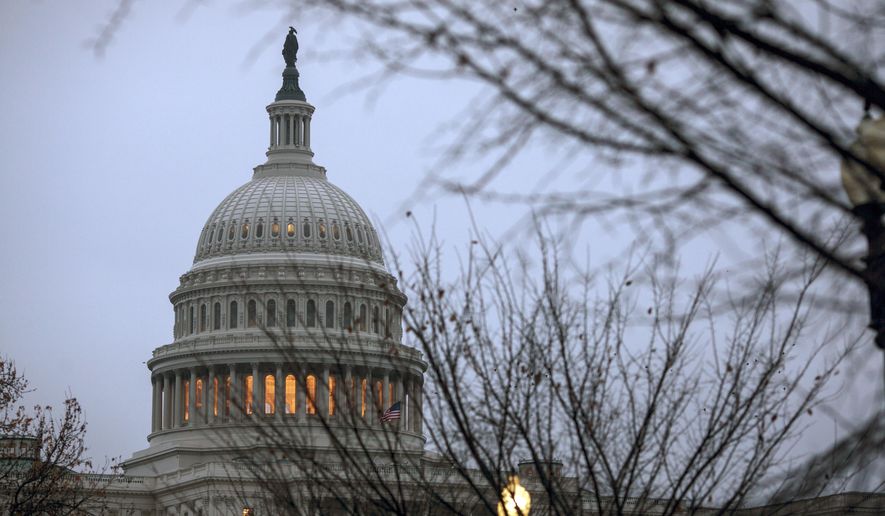Congress rallied around a stopgap bill to keep the government open for another two weeks, freeing up space for Republicans to finish their prized tax bill but setting up a bitter, pre-Christmas showdown on spending.
The House voted, 235-193, to extend federal funding until Dec. 22, after a sufficient number of conservatives rallied to the bill in the face of stated opposition from Democrats. The Senate swiftly followed suit, dispatching the bill to President Trump’s desk to avoid a shutdown on Saturday.
Negotiators will now have to sift through a series of thorny disagreements over spending and policy, from raises for the military to what to do about illegal-immigrant “Dreamers” brought to the U.S. as children.
“Along with enacting historic tax reform, we’ll be working together in the next two weeks to find a long-term solution to our funding needs while maintaining fiscal discipline,” House Speaker Paul D. Ryan said. “The American people deserve that.”
House Democrats withheld support for the continuing resolution, or “CR,” saying the GOP hadn’t backed their priorities, so majority Republicans had to prove they could pass the measure on their own. More than a dozen Democrats offered support once passage was no longer in doubt.
Conservatives in the House Freedom Caucus initially balked at the measure because it only ran through Dec. 22, leaving major decisions for the pre-Christmas rush to leave town. However, they didn’t want a messy shutdown fight didn’t distract from efforts to meld House and Senate versions of the GOP tax overhaul.
Some Freedom Caucus members provided votes to assist GOP leaders, although 18 Republicans voted “no.”
Meanwhile, at the White House, President Trump met with congressional leaders and Defense Secretary James Mattis to discuss a path forward on defense spending, immigration and other sticking points to avoid a shutdown around the holidays.
The leaders opened the meeting with pleasantries about reaching an agreement — a turnabout from late November, when Senate Minority Leader Charles E. Schumer and House Minority Leader Nancy Pelosi abruptly pulled out of a similar meeting because Mr. Trump said their demands spoiled hopes for a deal.
This time, the pair said they had “a productive conversation on a wide variety of issues.”
“Nothing specific has been agreed to, but discussions continue,” the Democrats said.
Finding common ground won’t be easy. Mr. Trump wants to beef up border security and the military — Mr. Mattis addressed leaders in the Situation Room. And while Democrats agreed to boost defense, they want equal increases for domestic spending. They also want to protect 800,000 “Dreamers” and fund the Children’s Health Insurance Program without cutting other health programs.
“The president reiterated his priorities for ensuring any immigration package ends chain migration, constructs a border wall, and substantially strengthens immigration enforcement to stop illegal immigration and visa overstays,” White House Press Secretary Sarah Huckabee Sanders said. “The respective parties agreed to resume negotiations on a two-year budget cap deal tomorrow.”
Mr. Trump has rescinded the so-called DACA deportation amnesty that was ordered by then-President Barack Obama, leaving Congress until March to deal with the Dreamers. All sides say they want a resolution, but some Democrats want to deal with it now. “We will not leave here without a DACA fix,” Mrs. Pelosi said.
GOP leaders want to divorce the issue from spending, however, and House conservatives say they will reject any funding bill that lumps in DACA.
Instead, they want GOP leaders to fight for deal that boosts defense spending for the rest of the year, while letting domestic programs shuffle along under a continuing resolution.
“They say they’re going to fight on the 22nd. We’re taking them at their word,” said Freedom Caucus Chairman Mark Meadows, North Carolina Republican. “If they don’t fight on the 22nd, I think that there will be a lot of very disappointed Republican members well beyond just the Freedom Caucus.”
GOP leaders will have to make tough decisions in the days ahead, since any proposal will need support from at least eight Senate Democrats to get to 60 votes and make it through the upper chamber. In the past, House GOP leaders have relied on Democrats to overcome dissent from archconservatives.
Mrs. Pelosi said taking care of defense, while ignoring domestic priorities, is a nonstarter.
“As we raise the caps, we are calling for parity,” she said. “We need resources for a strong national defense, but we also need a strong domestic budget.”
Rep. Luis Gutierrez, Illinois Democrat and champion for Dreamers, said if the GOP needs Democrats like him to vote for a final bill, he should get what he wants in return.
“You want a Republican budget? Find Republican votes for it,” he said. “You want a bipartisan budget, and you want my vote? Then make it an American budget — one that includes a pathway to freedom for our Dreamers. It’s the right thing to do.”
• Tom Howell Jr. can be reached at thowell@washingtontimes.com.




Please read our comment policy before commenting.